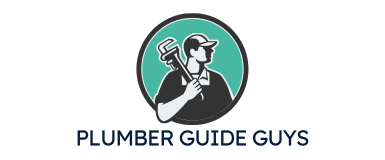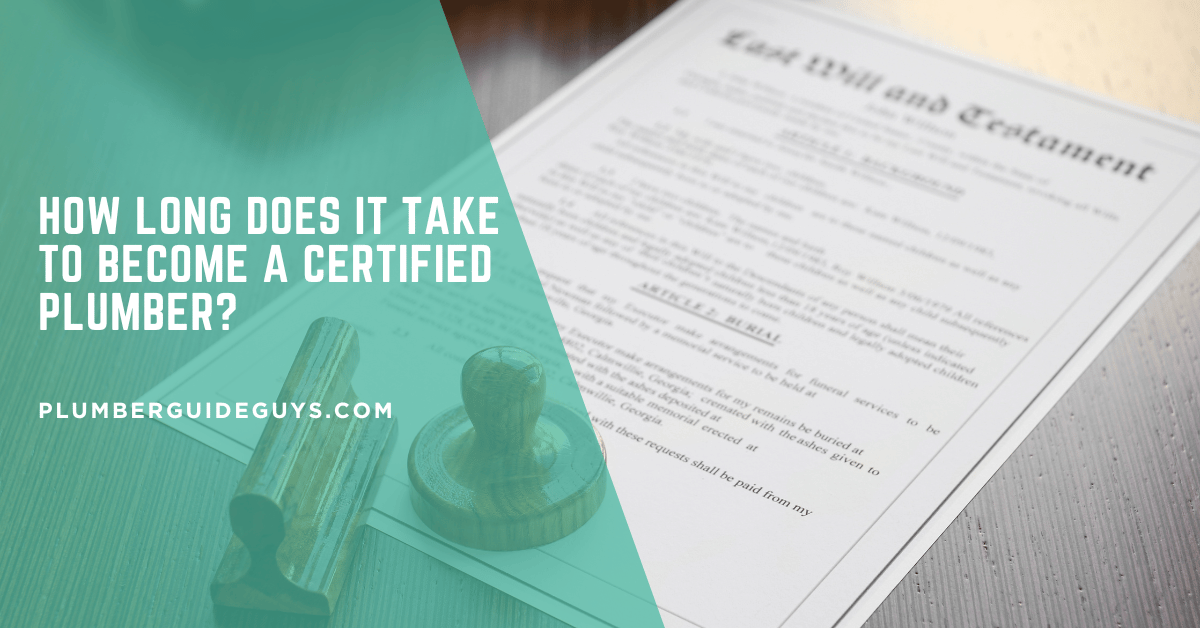Affiliate Disclosure
Plumber Guide Guys is a participant in the Amazon Services LLC Associates Program, an affiliate advertising program designed to provide a means for sites to earn advertising fees by advertising and linking to Amazon.
How Long Does It Take to Become a Certified Plumber? Did you know the plumbing industry is growing fast? It’s expected to grow by 5% by 2030. This means nearly 48,600 new jobs will open up each year. If you’re thinking about becoming a plumber, knowing how long it takes is key.
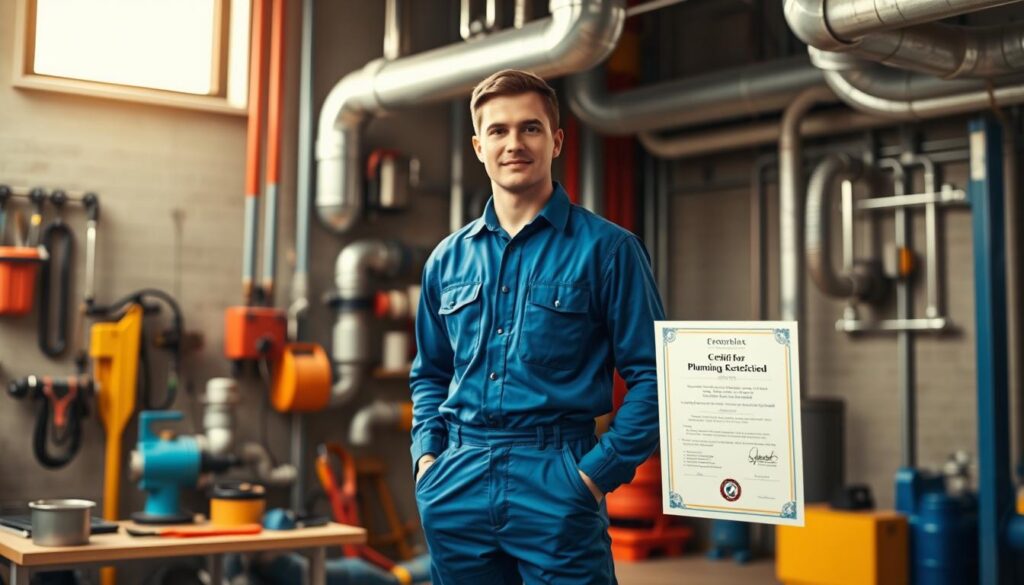
To become a certified plumber, you need to follow a few steps. First, you’ll get an education and then hands-on training. You’ll also need to get certified and meet state licensing rules. This whole process takes a few years of hard work.
How long it takes to become a plumber depends on a few things. Your location, education, and how much you want to learn all play a part. Each state has its own rules for getting licensed. But, most states want you to have a solid education and lots of practical experience.
Key Takeaways
- Plumbing certification typically takes 4-5 years to complete
- Requires combination of classroom and hands-on training
- State licensing is mandatory for professional practice
- Apprenticeship programs are critical for skill development
- Continuing education is essential for career advancement
Table of Contents
Overview of the Plumbing Certification Journey
Starting a plumbing career means going through a detailed certification process. You’ll go through education, training, and skill building. Knowing the plumber apprenticeship duration helps set your career goals.
Getting to be a certified plumber is tough but fulfilling. You’ll need hard work, technical skills, and a love for learning. The journey to get a plumbing license takes several years, with lots of training and growth.
Basic Requirements and Prerequisites
To kick off your plumbing career, you must meet some basic needs:
- High school diploma or equivalent
- Minimum age of 18 years
- Physical fitness and ability to perform manual labor
- Basic math and problem-solving skills
Understanding the Certification Path
Your certification journey has several main steps:
- Apprenticeship: 4-5 years of structured training
- Journeyman plumber qualification
- State licensing examinations
- Potential master plumber certification
Why Choose a Plumbing Career
Plumbing is a great career choice. It offers steady work, good pay, and chances to grow. With more people needing skilled trades, your plumbing career can be both secure and rewarding.
Plumbing is not just a job—it’s an essential service that keeps communities functioning smoothly.
How Long Does It Take to Become a Certified Plumber
Becoming a certified plumber takes hard work and careful planning. It usually takes 4 to 5 years to become a professional plumber. This time depends on your path and state rules.
To become a certified plumber, you’ll go through three main steps:
- Educational training
- Apprenticeship program
- State licensing examination
Getting journeyman plumber training is a big step. Apprenticeship programs last about 4-5 years. You’ll learn in class and get hands-on experience. You’ll need 8,000 to 10,000 hours of training to get certified.
“Success in plumbing is about mastering both technical skills and practical experience” – Professional Trades Association
Every state has its own rules for plumber certification. It’s important to check your local laws. Most states follow the same timeline, but some might be shorter or longer.
Your timeline can change based on:
- How fast you learn
- Apprenticeship availability
- Local licensing rules
- Your education choice
Putting in the time and effort to become a certified plumber is worth it. It leads to a stable, rewarding career with lots of growth and specialization opportunities.
Educational Requirements for Aspiring Plumbers
Starting a plumbing career means knowing the key educational steps. You’ll need to prepare well and choose the right education to meet plumber certification needs.
Getting ready for a plumbing career begins with good education. Most future plumbers must hit certain educational marks for success.
High School Diploma Essentials
High school is where your plumbing journey often starts. Having a diploma is key to get into plumbing trade school. Important subjects for your future include:
- Mathematics
- Physics
- Technical drawing
- Computer skills
Technical School Programs
Plumbing trade school lasts from 6 months to 2 years. These programs teach you vital plumbing skills and knowledge.
Essential Course Topics
Technical programs focus on key areas for certification:
- Blueprint reading
- Pipe system design
- Safety protocols
- Electrical systems
- Welding techniques
Investing in your education is the first step towards a rewarding plumbing career. The right training can significantly reduce the time needed to achieve professional certification.
Understanding the Apprenticeship Program Structure
To become a professional plumber, you need a structured apprenticeship. It combines hands-on experience with classroom learning. This journey usually takes 4-5 years, turning you from a beginner to a skilled plumber.
Apprenticeship programs are a detailed path to becoming a licensed plumber. Your path includes:
- Hands-on training with experienced professionals
- Technical classroom instruction
- Paid work experience
- Skill development in multiple plumbing disciplines
The time it takes to go from apprentice to licensed plumber is significant. You’ll need to complete about 2,000 hours of on-the-job training each year. Plus, you’ll get 144 hours of technical education annually.
“An apprenticeship is your roadmap to a successful career in plumbing” – Professional Plumbers Association
During your apprenticeship, you’ll learn many important things. These include:
- Blueprint reading
- Safety protocols
- Pipe installation techniques
- Plumbing system design
- Local building codes
Tip: Research local unions and trade schools to find the best apprenticeship programs in your area.
Required Training Hours and Technical Education
Becoming a professional plumber takes a lot of work. You’ll learn both by doing and by studying. Your training will help you get the skills and knowledge you need for the job.
Getting your plumbing license takes a lot of time and effort. Most programs mix on-the-job training with classroom learning. This way, you’ll get a broad range of skills.
On-the-Job Training Components
You’ll work with experienced plumbers during your training. You’ll learn by doing things like:
- Installing and repairing plumbing systems
- Reading and interpreting technical blueprints
- Understanding safety protocols
- Learning how to use special equipment
Classroom Instruction Hours
Learning in a classroom is also important. You’ll study things like:
- Math and physics for plumbing
- Local and state plumbing codes
- Advanced pipe fitting techniques
- How electrical and mechanical systems work together
Skills Development Timeline
Your training will last about 4-5 years. You’ll spend around 8,000 hours on the job and 600-800 hours in class.
“Dedication and consistent learning are key to mastering the plumbing trade.” – Professional Plumbing Association
State Licensing Requirements and Examinations
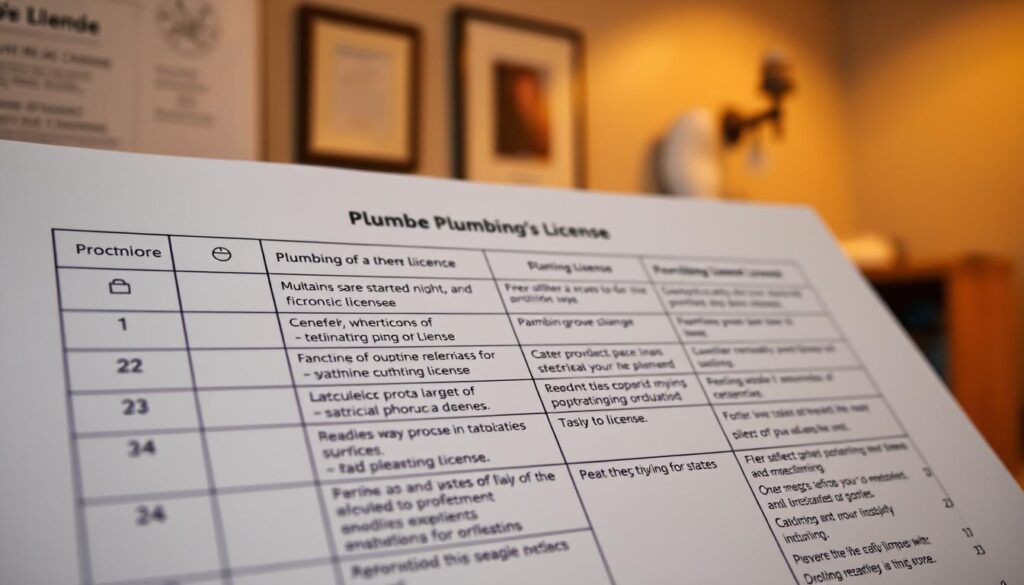
Getting a plumbing license is a big step. Each state has its own rules for becoming a plumber. You need to know and follow these rules to get your license.
Here are the main steps to get a plumbing license:
- Pass a written exam to show you know the technical stuff.
- Show you’ve done the required apprenticeship hours.
- Demonstrate your practical skills.
- Pass a background check and get professional references.
The exams cover important areas:
- Plumbing codes and regulations
- Safety rules
- Understanding plumbing systems
- Local and state building standards
To pass the exams, you need to prepare well. Most states require a certain number of training hours. You also need to pass both written and practical exams.
You’ll need to know a lot about plumbing systems, building codes, and safety rules.
Professional tip: Always check your specific state’s licensing board for most current requirements, as regulations can change annually.
Licensing exam costs vary from $100 to $500. This depends on your state and the exam’s complexity. Some places might need extra certifications for certain plumbing jobs.
Advancement from Apprentice to Journeyman Plumber
Going from apprentice to journeyman plumber is a big step in your plumbing career. It takes hard work, skill, and meeting certain professional standards.
Required Experience Levels
To become a journeyman plumber, you need to finish a tough apprenticeship program. This usually takes 4-5 years. During this time, you gain vital experience.
- Minimum 4 years of apprenticeship work
- 2,000 hours of on-the-job training per year
- 144 hours of technical classroom instruction annually
Professional Certifications
To get certified, you must pass tough exams. These tests check your technical knowledge and skills. They prove you’re skilled in different plumbing areas.
| Certification Type | Requirements | Duration |
|---|---|---|
| State Journeyman License | Completed apprenticeship, exam passage | 4-5 years |
| Specialized Plumbing Certification | Additional technical training | 6-12 months |
Continuing Education Requirements
To keep your journeyman plumber status, you must keep learning. Most states require continuing education credits. This keeps you up-to-date with new tech and rules.
- Annual renewal of professional license
- 8-16 hours of continuing education courses
- Stay updated on building codes and regulations
Master Plumber Certification Path
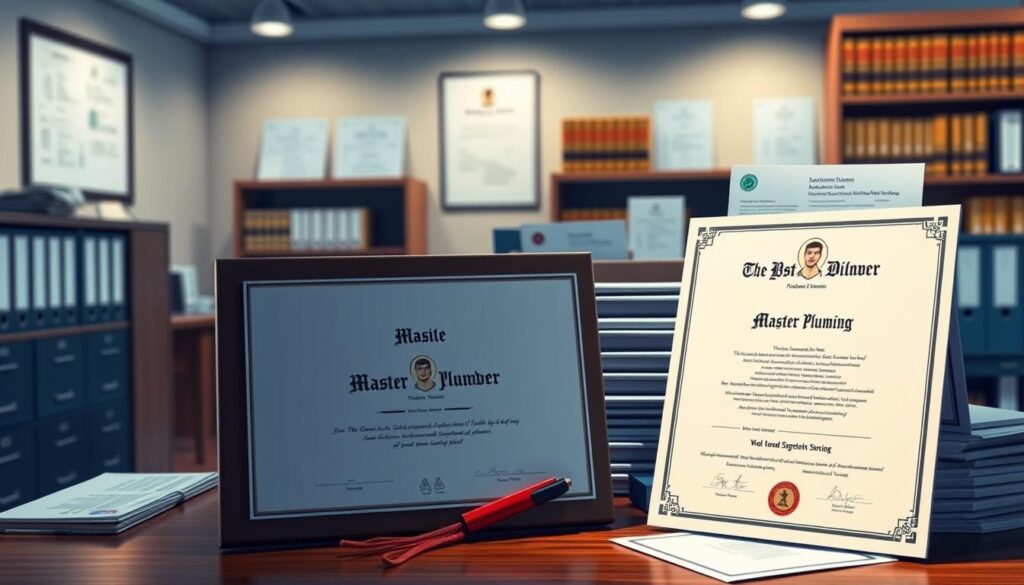
Becoming a master plumber is the top goal in the plumbing field. It takes a lot of hard work, experience, and knowledge. You’ll go through many steps to get to this high level.
The path to becoming a master plumber includes several key steps:
- Completing a detailed apprenticeship program
- Having at least 5-7 years of work experience
- Passing tough state licensing tests
- Showing off your advanced skills and management abilities
The rules for getting a master plumber certification differ by state. But, most places want you to show both practical skills and knowledge. You’ll need to pass tests that check your understanding of complex plumbing, local codes, and advanced skills.
| Certification Level | Experience Required | Examination Focus |
|---|---|---|
| Apprentice | 0-2 years | Basic Skills |
| Journeyman | 2-5 years | Intermediate Skills |
| Master Plumber | 5-7 years | Advanced Technical Knowledge |
Getting to be a master plumber is not just a personal win. It opens doors to better pay, more responsibilities, and starting your own plumbing business. Your skills will be seen as the top in the plumbing world.
Conclusion
Starting your journey to become a certified plumber is exciting. It takes about 4 to 6 years, depending on your state’s rules and how hard you work.
To get your plumbing license, you need to follow a few steps. First, finish high school or get an equivalent. Then, go to a technical program. Next, do an apprenticeship and pass state exams.
Each step helps you learn important skills. These skills turn you into a skilled tradesperson.
It’s important to research your state’s rules for getting certified. Even though the steps are similar, each state has its own rules. Spend time learning about your state’s needs, join plumbing groups, and keep learning.
Being a certified plumber is a great career choice. It offers good pay, job security, and chances to grow. Your hard work and dedication to learning will help you succeed in this important trade.
FAQ
How long does it typically take to become a certified plumber?
What educational requirements do I need to start a plumbing career?
What does a plumbing apprenticeship involve?
Do plumbing requirements differ by state?
What are the steps to becoming a licensed plumber?
How much does plumbing training cost?
How long does it typically take to become a certified plumber?
What educational requirements do I need to start a plumbing career?
What does a plumbing apprenticeship involve?
Do plumbing requirements differ by state?
What are the steps to becoming a licensed plumber?
How much does plumbing training cost?
FAQ
How long does it typically take to become a certified plumber?
It usually takes 4-5 years to become a certified plumber. This includes education, an apprenticeship, and getting your license. The exact time can vary based on your state, education, and how fast you learn.
What educational requirements do I need to start a plumbing career?
You need a high school diploma or equivalent to start. Many also go to technical school or community college. These programs teach math, pipe design, and local codes.
What does a plumbing apprenticeship involve?
An apprenticeship mixes on-the-job training with classroom learning. You work with experienced plumbers and learn in school. This way, you get both practical and theoretical skills.
Do plumbing requirements differ by state?
Yes, plumbing rules change by state. The basic steps are the same, but specifics like training hours and exams can vary. Always check your state’s licensing board for details.
What are the steps to becoming a licensed plumber?
First, finish high school. Then, go to technical school and join an apprenticeship. After work experience and passing exams, you get your journeyman license. More experience leads to a master plumber certification.
How much does plumbing training cost?
Costs range from
FAQ
How long does it typically take to become a certified plumber?
It usually takes 4-5 years to become a certified plumber. This includes education, an apprenticeship, and getting your license. The exact time can vary based on your state, education, and how fast you learn.
What educational requirements do I need to start a plumbing career?
You need a high school diploma or equivalent to start. Many also go to technical school or community college. These programs teach math, pipe design, and local codes.
What does a plumbing apprenticeship involve?
An apprenticeship mixes on-the-job training with classroom learning. You work with experienced plumbers and learn in school. This way, you get both practical and theoretical skills.
Do plumbing requirements differ by state?
Yes, plumbing rules change by state. The basic steps are the same, but specifics like training hours and exams can vary. Always check your state’s licensing board for details.
What are the steps to becoming a licensed plumber?
First, finish high school. Then, go to technical school and join an apprenticeship. After work experience and passing exams, you get your journeyman license. More experience leads to a master plumber certification.
How much does plumbing training cost?
Costs range from $1,000 to $20,000. Technical school costs $3,000 to $15,000. Apprenticeships are cheaper because you earn while you learn.
What is the difference between a journeyman and master plumber?
A journeyman plumber works on their own after training. A master plumber has more experience and can design systems, pull permits, and supervise others.
Can I become a plumber if I didn’t do well in math in high school?
Basic math is key in plumbing, but you can learn it. Many programs offer help and courses to improve your math skills.
What is the average salary for a certified plumber?
Plumbers earn a median of $56,330 a year, according to the Bureau of Labor Statistics. Experienced plumbers can make over $90,000, depending on location and experience.
Are there opportunities for advancement in the plumbing field?
Yes, there are many ways to grow in plumbing. You can move from apprentice to journeyman, then to master plumber. You can also specialize, manage projects, start your own business, or work in design and inspection.
,000 to ,000. Technical school costs ,000 to ,000. Apprenticeships are cheaper because you earn while you learn.
What is the difference between a journeyman and master plumber?
A journeyman plumber works on their own after training. A master plumber has more experience and can design systems, pull permits, and supervise others.
Can I become a plumber if I didn’t do well in math in high school?
Basic math is key in plumbing, but you can learn it. Many programs offer help and courses to improve your math skills.
What is the average salary for a certified plumber?
Plumbers earn a median of ,330 a year, according to the Bureau of Labor Statistics. Experienced plumbers can make over ,000, depending on location and experience.
Are there opportunities for advancement in the plumbing field?
Yes, there are many ways to grow in plumbing. You can move from apprentice to journeyman, then to master plumber. You can also specialize, manage projects, start your own business, or work in design and inspection.
